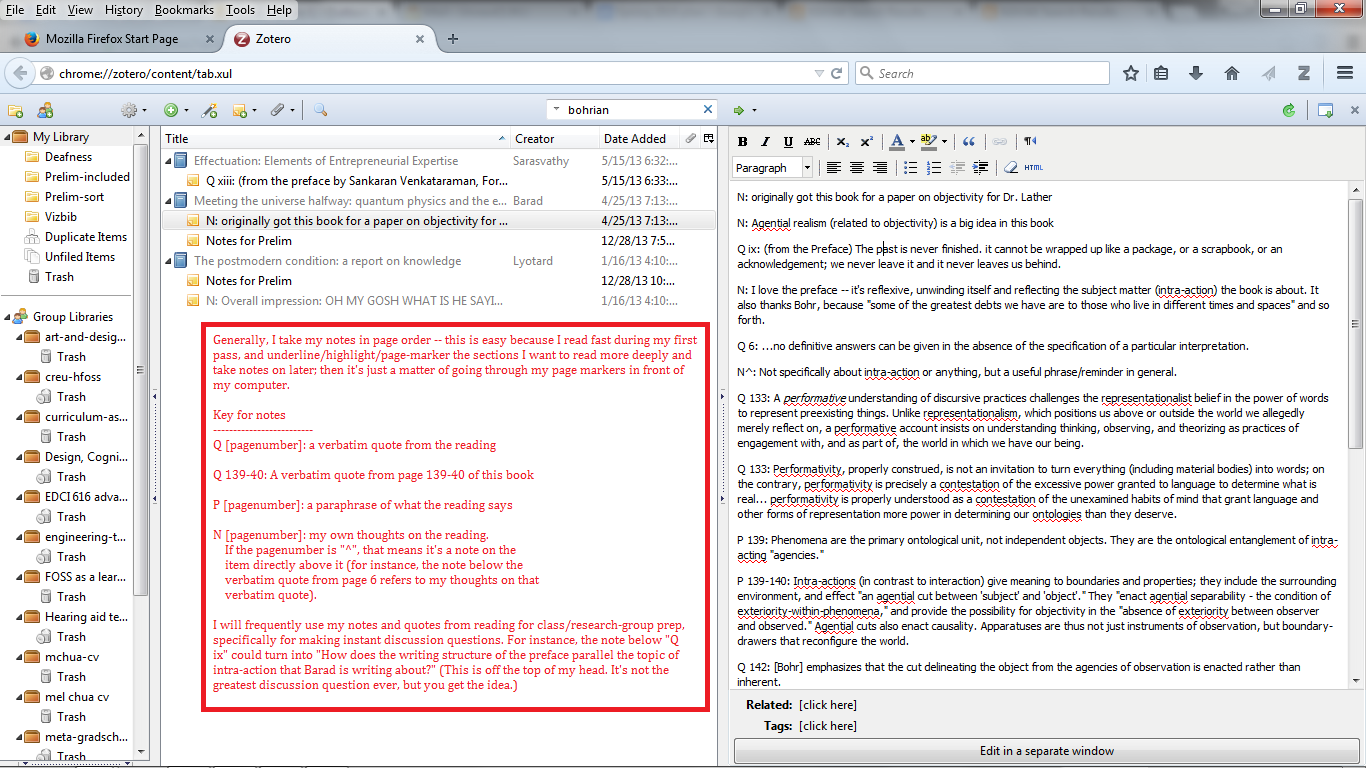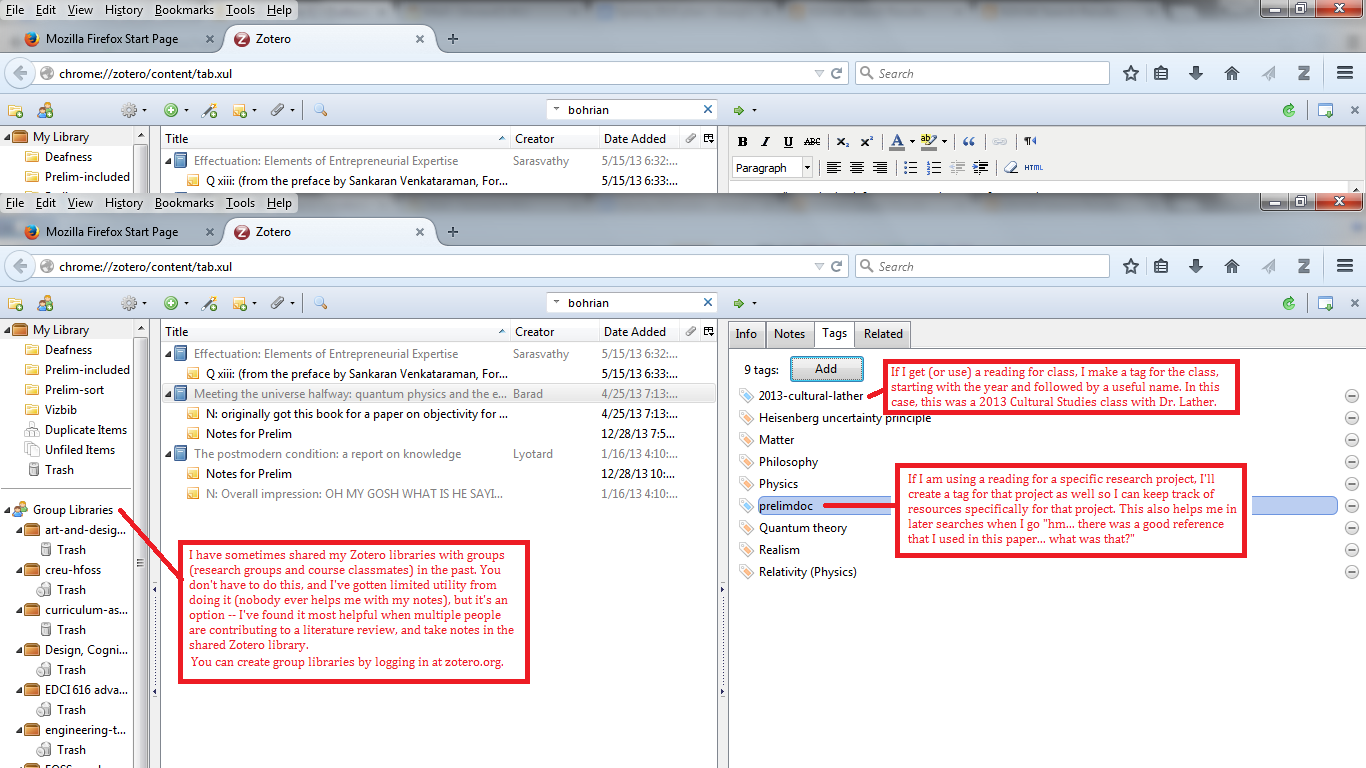How I use Zotero to take research reading notes
Here's how I take notes for my classes/research. I currently use an open source citation manager.
The two images below show screenshots from my actual setup. The blog post text is the same as the text in the images (click to enlarge), but I'm writing it up here for screenreader accessibility and web searchability.
The first image shows how I take notes on actual books.
Generally, I take my notes in page order -- this is easy because I read fast during my first pass, and underline/highlight/page-marker the sections I want to read more deeply and take notes on later; then it's just a matter of going through my page markers in front of my computer.
(The first screenshot shows the Zotero interface with my notes for Karen Barad's book "Meeting the universe halfway." I'll first list my annotations here, then list the notes that they refer to.)
Annotations
Q [pagenumber]: a verbatim quote from the reading. For instance:
Q 139-40: A verbatim quote from page 139-40 of this book.
P [pagenumber]: a paraphrase of what the reading says
N [pagenumber]: my own thoughts on the reading. If the pagenumber is "^", that means it's a note on the item directly above it (for instance, the note below the verbatim quote from page 6 refers to my thoughts on that verbatim quote).
An excerpt of my actual notes on this book
N: originally got this book for a paper on objectivity for Dr. Lather
N: Agential realism (related to objectivity) is a big idea in this book
Q ix: (from the Preface) The past is never finished. it cannot be wrapped up like a package, or a scrapbook, or an acknowledgement; we never leave it and it never leaves us behind.
N: I love the preface -- it's reflexive, unwinding itself and reflecting the subject matter (intra-action) the book is about. It also thanks Bohr, because "some of the greatest debts we have are to those who live in different times and spaces" and so forth.
Q 6: ...no definitive answers can be given in the absence of the specification of a particular interpretation.
N^: Not specifically about intra-action or anything, but a useful phrase/reminder in general.
Q 133: A performative understanding of discursive practices challenges the representationalist belief in the power of words to represent preexisting things. Unlike representationalism, which positions us above or outside the world we allegedly merely reflect on, a performative account insists on understanding thinking, observing, and theorizing as practices of engagement with, and as part of, the world in which we have our being.
Q 133: Performativity, properly construed, is not an invitation to turn everything (including material bodies) into words; on the contrary, performativity is precisely a contestation of the excessive power granted to language to determine what is real... performativity is properly understood as a contestation of the unexamined habits of mind that grant language and other forms of representation more power in determining our ontologies than they deserve.
P 139: Phenomena are the primary ontological unit, not independent objects. They are the ontological entanglement of intra-acting "agencies."
P 139-140: Intra-actions (in contrast to interaction) give meaning to boundaries and properties; they include the surrounding environment, and effect "an agential cut between 'subject' and 'object'." They "enact agential separability - the condition of exteriority-within-phenomena," and provide the possibility for objectivity in the "absence of exteriority between observer and observed." Agential cuts also enact causality. Apparatuses are thus not just instruments of observation, but boundary-drawers that reconfigure the world.
Q 142: [Bohr] emphasizes that the cut delineating the object from the agencies of observation is enacted rather than inherent.
I will frequently use my notes and quotes from reading for class/research-group prep, specifically for making instant discussion questions. For instance, the note below "Q ix" could turn into "How does the writing structure of the preface parallel the topic of intra-action that Barad is writing about?" (This is off the top of my head. It's not the greatest discussion question ever, but you get the idea.)
The second image shows how I use tags in Zotero:
I have sometimes shared my Zotero libraries with groups (research groups and course classmates) in the past. You don't have to do this, and I've gotten limited utility from doing it (nobody ever helps me with my notes), but it's an option -- I've found it most helpful when multiple people are contributing to a literature review, and take notes in the shared Zotero library. You can create group libraries by logging in at zotero.org.
If I get (or use) a reading for class, I make a tag for the class (and mark the document with the appropriate tag: the screenshot points to Zotero's tag interface). In this case, this tag (2013-cultural-lather) was [for] a 2013 Cultural Studies class with Dr. Lather.
If I am using a reading for the reading for a specific project, I'll create a tag for that project as well so I can keep track of resources specifically for that project. (The screenshot points to a tag called "prelimdoc.") This also helps me in later searches when I go "hm... there was a good reference I used in this paper... what was that?"

